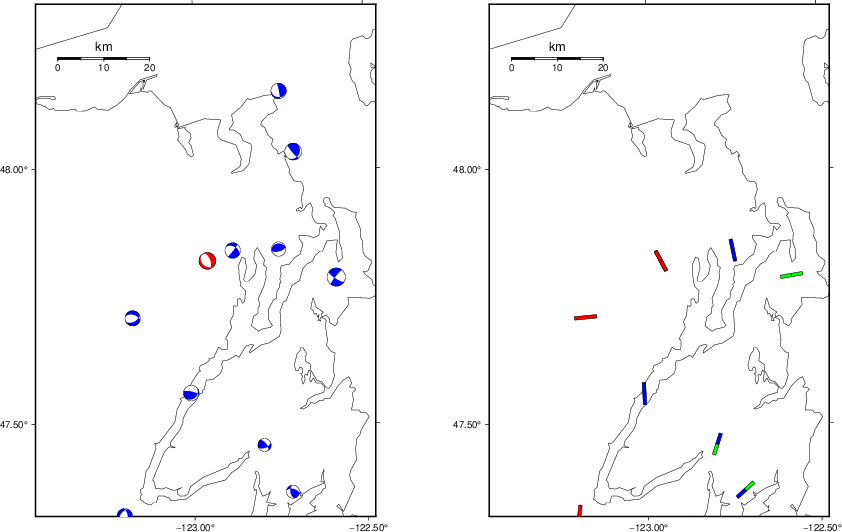Location
Location ANSS
The ANSS event ID is uw61977871 and the event page is at
https://earthquake.usgs.gov/earthquakes/eventpage/uw61977871/executive.
2023/12/24 15:14:04 47.820 -122.960 52.4 4.04 Washington
Focal Mechanism
USGS/SLU Moment Tensor Solution
ENS 2023/12/24 15:14:04:0 47.82 -122.96 52.4 4.0 Washington
Stations used:
UW.BHW UW.EPH2 UW.GNW UW.LRIV UW.LTY UW.PAN4H UW.WATCH
Filtering commands used:
cut o DIST/3.3 -40 o DIST/3.3 +50
rtr
taper w 0.1
hp c 0.03 n 3
lp c 0.07 n 3
br c 0.12 0.25 n 4 p 2
Best Fitting Double Couple
Mo = 1.97e+22 dyne-cm
Mw = 4.13
Z = 72 km
Plane Strike Dip Rake
NP1 340 60 -75
NP2 132 33 -114
Principal Axes:
Axis Value Plunge Azimuth
T 1.97e+22 14 59
N 0.00e+00 13 152
P -1.97e+22 71 284
Moment Tensor: (dyne-cm)
Component Value
Mxx 4.77e+21
Mxy 8.69e+21
Mxz 8.60e+20
Myy 1.17e+22
Myz 9.82e+21
Mzz -1.65e+22
##############
--------##############
-------------###############
----------------##############
#------------------############
#--------------------########### T #
##----------------------######### ##
###----------------------###############
###-----------------------##############
####----------- ----------##############
#####---------- P -----------#############
#####---------- -----------#############
######------------------------############
######-----------------------###########
#######----------------------###########
########--------------------##########
########-------------------#########
##########----------------########
###########-------------######
###############--------##---
###################---
##############
Global CMT Convention Moment Tensor:
R T P
-1.65e+22 8.60e+20 -9.82e+21
8.60e+20 4.77e+21 -8.69e+21
-9.82e+21 -8.69e+21 1.17e+22
Details of the solution is found at
http://www.eas.slu.edu/eqc/eqc_mt/MECH.NA/20231224151404/index.html
|
Preferred Solution
The preferred solution from an analysis of the surface-wave spectral amplitude radiation pattern, waveform inversion or first motion observations is
STK = 340
DIP = 60
RAKE = -75
MW = 4.13
HS = 72.0
The NDK file is 20231224151404.ndk
The waveform inversion is preferred.
Magnitudes
Given the availability of digital waveforms for determination of the moment tensor, this section documents the added processing leading to mLg, if appropriate to the region, and ML by application of the respective IASPEI formulae. As a research study, the linear distance term of the IASPEI formula
for ML is adjusted to remove a linear distance trend in residuals to give a regionally defined ML. The defined ML uses horizontal component recordings, but the same procedure is applied to the vertical components since there may be some interest in vertical component ground motions. Residual plots versus distance may indicate interesting features of ground motion scaling in some distance ranges. A residual plot of the regionalized magnitude is given as a function of distance and azimuth, since data sets may transcend different wave propagation provinces.
ML Magnitude

Left: ML computed using the IASPEI formula for Horizontal components. Center: ML residuals computed using a modified IASPEI formula that accounts for path specific attenuation; the values used for the trimmed mean are indicated. The ML relation used for each figure is given at the bottom of each plot.
Right: Residuals from new relation as a function of distance and azimuth.

Left: ML computed using the IASPEI formula for Vertical components (research). Center: ML residuals computed using a modified IASPEI formula that accounts for path specific attenuation; the values used for the trimmed mean are indicated. The ML relation used for each figure is given at the bottom of each plot.
Right: Residuals from new relation as a function of distance and azimuth.
Context
The left panel of the next figure presents the focal mechanism for this earthquake (red) in the context of other nearby events (blue) in the SLU Moment Tensor Catalog. The right panel shows the inferred direction of maximum compressive stress and the type of faulting (green is strike-slip, red is normal, blue is thrust; oblique is shown by a combination of colors). Thus context plot is useful for assessing the appropriateness of the moment tensor of this event.
Waveform Inversion using wvfgrd96
The focal mechanism was determined using broadband seismic waveforms. The location of the event (star) and the
stations used for (red) the waveform inversion are shown in the next figure.
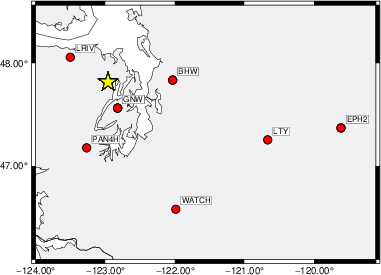
|
|
Location of broadband stations used for waveform inversion
|
The program wvfgrd96 was used with good traces observed at short distance to determine the focal mechanism, depth and seismic moment. This technique requires a high quality signal and well determined velocity model for the Green's functions. To the extent that these are the quality data, this type of mechanism should be preferred over the radiation pattern technique which requires the separate step of defining the pressure and tension quadrants and the correct strike.
The observed and predicted traces are filtered using the following gsac commands:
cut o DIST/3.3 -40 o DIST/3.3 +50
rtr
taper w 0.1
hp c 0.03 n 3
lp c 0.07 n 3
br c 0.12 0.25 n 4 p 2
The results of this grid search are as follow:
DEPTH STK DIP RAKE MW FIT
WVFGRD96 2.0 145 45 95 3.63 0.4536
WVFGRD96 4.0 180 85 65 3.71 0.5026
WVFGRD96 6.0 175 85 60 3.72 0.5840
WVFGRD96 8.0 175 90 60 3.75 0.5945
WVFGRD96 10.0 350 85 -55 3.74 0.5888
WVFGRD96 12.0 180 80 45 3.74 0.5848
WVFGRD96 14.0 185 70 40 3.76 0.5867
WVFGRD96 16.0 180 80 40 3.76 0.5893
WVFGRD96 18.0 185 75 40 3.77 0.5919
WVFGRD96 20.0 180 80 35 3.80 0.5932
WVFGRD96 22.0 180 80 40 3.81 0.5912
WVFGRD96 24.0 180 85 40 3.81 0.5908
WVFGRD96 26.0 155 30 -65 3.90 0.5848
WVFGRD96 28.0 180 85 40 3.83 0.5916
WVFGRD96 30.0 150 25 -80 3.90 0.5924
WVFGRD96 32.0 155 30 -75 3.91 0.5957
WVFGRD96 34.0 155 30 -75 3.92 0.6003
WVFGRD96 36.0 155 30 -75 3.93 0.5984
WVFGRD96 38.0 160 35 -70 3.95 0.5881
WVFGRD96 40.0 155 35 -70 4.06 0.5888
WVFGRD96 42.0 5 90 -60 3.98 0.5916
WVFGRD96 44.0 185 90 60 4.00 0.5973
WVFGRD96 46.0 360 85 -65 4.01 0.6038
WVFGRD96 48.0 -5 80 -70 4.02 0.6116
WVFGRD96 50.0 -10 75 -70 4.03 0.6191
WVFGRD96 52.0 -10 75 -75 4.04 0.6284
WVFGRD96 54.0 355 75 -75 4.05 0.6361
WVFGRD96 56.0 350 70 -75 4.06 0.6449
WVFGRD96 58.0 350 70 -75 4.07 0.6541
WVFGRD96 60.0 345 65 -75 4.08 0.6620
WVFGRD96 62.0 345 65 -75 4.09 0.6683
WVFGRD96 64.0 -15 65 -75 4.09 0.6729
WVFGRD96 66.0 345 65 -75 4.10 0.6751
WVFGRD96 68.0 350 65 -75 4.10 0.6776
WVFGRD96 70.0 340 60 -75 4.12 0.6789
WVFGRD96 72.0 340 60 -75 4.13 0.6794
WVFGRD96 74.0 340 60 -75 4.14 0.6792
WVFGRD96 76.0 340 60 -75 4.14 0.6776
WVFGRD96 78.0 340 60 -75 4.15 0.6761
WVFGRD96 80.0 340 60 -75 4.15 0.6728
WVFGRD96 82.0 340 60 -75 4.16 0.6699
WVFGRD96 84.0 340 60 -75 4.16 0.6662
WVFGRD96 86.0 340 60 -75 4.17 0.6632
WVFGRD96 88.0 340 60 -75 4.17 0.6621
WVFGRD96 90.0 340 60 -75 4.18 0.6610
WVFGRD96 92.0 340 60 -75 4.18 0.6584
WVFGRD96 94.0 340 60 -75 4.19 0.6570
WVFGRD96 96.0 340 60 -80 4.19 0.6549
WVFGRD96 98.0 340 60 -80 4.20 0.6527
The best solution is
WVFGRD96 72.0 340 60 -75 4.13 0.6794
The mechanism corresponding to the best fit is
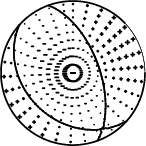
|
|
Figure 1. Waveform inversion focal mechanism
|
The best fit as a function of depth is given in the following figure:
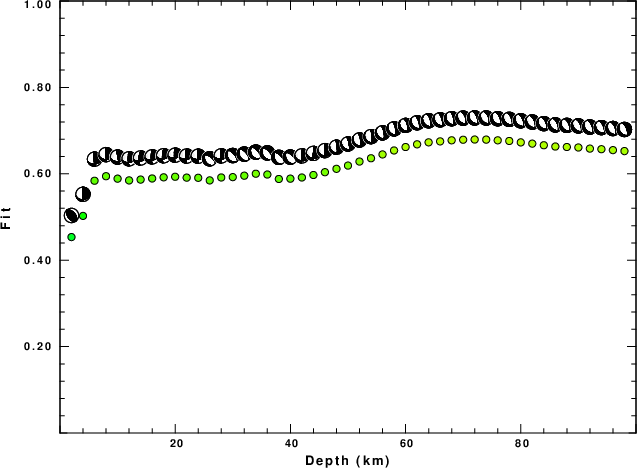
|
|
Figure 2. Depth sensitivity for waveform mechanism
|
The comparison of the observed and predicted waveforms is given in the next figure. The red traces are the observed and the blue are the predicted.
Each observed-predicted component is plotted to the same scale and peak amplitudes are indicated by the numbers to the left of each trace. A pair of numbers is given in black at the right of each predicted traces. The upper number it the time shift required for maximum correlation between the observed and predicted traces. This time shift is required because the synthetics are not computed at exactly the same distance as the observed, the velocity model used in the predictions may not be perfect and the epicentral parameters may be be off.
A positive time shift indicates that the prediction is too fast and should be delayed to match the observed trace (shift to the right in this figure). A negative value indicates that the prediction is too slow. The lower number gives the percentage of variance reduction to characterize the individual goodness of fit (100% indicates a perfect fit).
The bandpass filter used in the processing and for the display was
cut o DIST/3.3 -40 o DIST/3.3 +50
rtr
taper w 0.1
hp c 0.03 n 3
lp c 0.07 n 3
br c 0.12 0.25 n 4 p 2
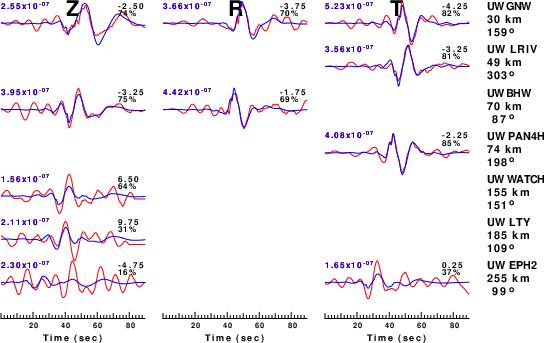
|
|
Figure 3. Waveform comparison for selected depth. Red: observed; Blue - predicted. The time shift with respect to the model prediction is indicated. The percent of fit is also indicated. The time scale is relative to the first trace sample.
|
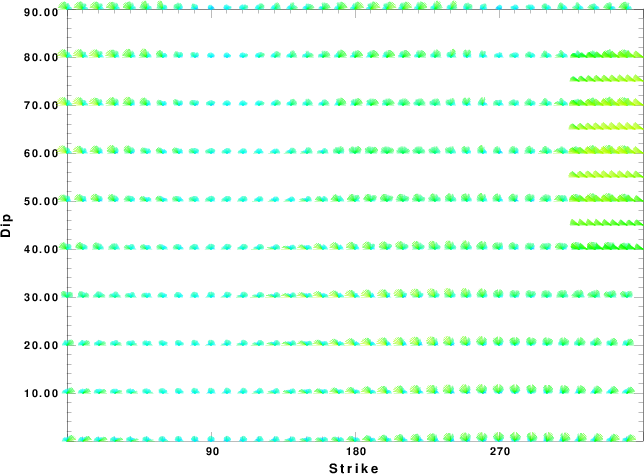
|
|
Focal mechanism sensitivity at the preferred depth. The red color indicates a very good fit to the waveforms.
Each solution is plotted as a vector at a given value of strike and dip with the angle of the vector representing the rake angle, measured, with respect to the upward vertical (N) in the figure.
|
A check on the assumed source location is possible by looking at the time shifts between the observed and predicted traces. The time shifts for waveform matching arise for several reasons:
- The origin time and epicentral distance are incorrect
- The velocity model used for the inversion is incorrect
- The velocity model used to define the P-arrival time is not the
same as the velocity model used for the waveform inversion
(assuming that the initial trace alignment is based on the
P arrival time)
Assuming only a mislocation, the time shifts are fit to a functional form:
Time_shift = A + B cos Azimuth + C Sin Azimuth
The time shifts for this inversion lead to the next figure:
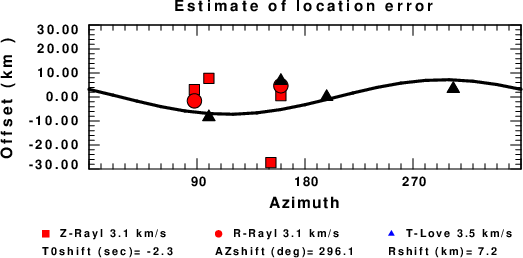
The derived shift in origin time and epicentral coordinates are given at the bottom of the figure.
Velocity Model
The WUS.model used for the waveform synthetic seismograms and for the surface wave eigenfunctions and dispersion is as follows
(The format is in the model96 format of Computer Programs in Seismology).
MODEL.01
Model after 8 iterations
ISOTROPIC
KGS
FLAT EARTH
1-D
CONSTANT VELOCITY
LINE08
LINE09
LINE10
LINE11
H(KM) VP(KM/S) VS(KM/S) RHO(GM/CC) QP QS ETAP ETAS FREFP FREFS
1.9000 3.4065 2.0089 2.2150 0.302E-02 0.679E-02 0.00 0.00 1.00 1.00
6.1000 5.5445 3.2953 2.6089 0.349E-02 0.784E-02 0.00 0.00 1.00 1.00
13.0000 6.2708 3.7396 2.7812 0.212E-02 0.476E-02 0.00 0.00 1.00 1.00
19.0000 6.4075 3.7680 2.8223 0.111E-02 0.249E-02 0.00 0.00 1.00 1.00
0.0000 7.9000 4.6200 3.2760 0.164E-10 0.370E-10 0.00 0.00 1.00 1.00
Last Changed Tue Apr 23 06:47:51 AM CDT 2024


